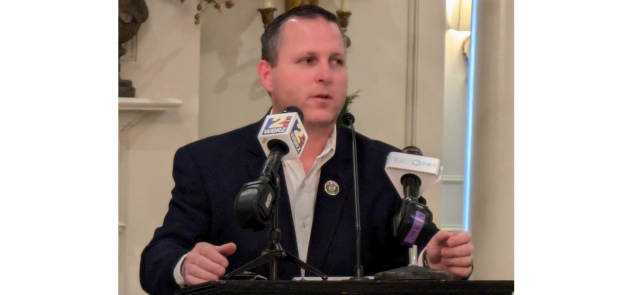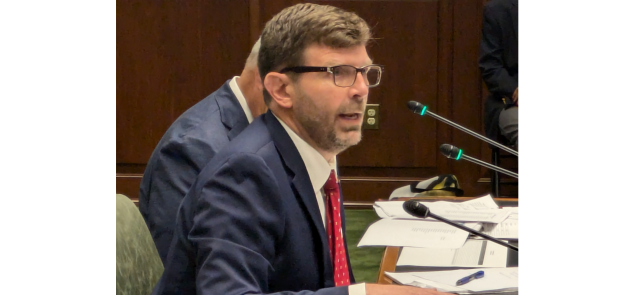Stay ahead of the curve as a political insider with deep policy analysis, daily briefings and policy-shaping tools.
Request a DemoGuest Column: As term comes to an end, Congressman Graves is ‘running through the tape’

Congressman Garret Graves
Diners, dives and … democracy.
As a creature of habit, I frequently return to south Louisiana diners every time the U.S. House is not in session – unannounced and unscheduled – to get real-time, unvarnished perspectives from everyday folks.
Constantly engaging folks where they are has proven more valuable than expensive polling and high-priced consultants, and the ideas generated by local people on local problems have been the source of many of our legislative accomplishments. The food is pretty good too.
Recently, we secured the requisite bipartisan support to force a vote on H.R. 82, the Social Security Fairness Act. Our bill will correct a 40-year-old penalty against police, firefighters, teachers and other public servants that denies them the Social Security benefits they’ve earned. The entire Louisiana congressional delegation supports our fix.
A sad truth is that at many places we visit, there is still PTSD from the 2016 flood, Hurricane Ida and now Hurricane Francine.
For better or worse, Louisiana has much experience when it comes to disasters. In fact, most of the Disaster Recovery & Reform Act – the last major FEMA reform bill – is a product of lessons from the 2016 flood. All our reforms make vast improvements to response and recovery, which benefits the entire country.
Within just two weeks of Hurricane Francine making landfall, we pushed through committee five important FEMA reform bills (H.R. 8728, H.R. 6083, H.R. 2672 and H.R. 7671/6084) that will deliver disaster assistance more quickly, and fix in totality the nagging “duplication of benefits” penalty that has unfairly denied some disaster victims the assistance they deserve to recover.
You can imagine that after several cups of coffee, diners share many thoughts about the inefficiency of government. They cite the Comite flood project, Morganza hurricane protection project, West Shore hurricane protection and Mississippi River bridge as examples of clearly defined government initiatives that have been stuck since the 1970s and 1980s.
We’ve spent our time in the House obsessing over inexplicable delays on transformational projects such as these. The Louisiana citizens who are tortured by skyrocketing flood and home insurance costs, repetitive flooding and traffic bottlenecks often feel like their pleas are ignored. It’s why we’ve broken the logjams on these projects while securing federal funding for all of them.
When you meet the people where they are, and you hear about their daily struggles – much of which comes from government inaction and interference – the objectives of the job (no matter the elected office) are crystal clear and five-alarm urgent.
When I was first a candidate for Congress, everywhere I went folks consistently raised two priorities: repeal the WEP & GPO and give states authority to regulate red snapper fishing. We took care of red snapper almost immediately.
And we’re closing in on WEP & GPO to bookend our term, if the Senate will cooperate. We’re securing funds for the flood projects that will protect lives, homes and communities. We’re running through the tape – so when we visit diners and look folks in the eyes, we can say, “We did it.”
Congressman Garret Graves represents Louisiana’s 6th District in the U.S. House of Representatives. He is not running for reelection.
This column has been lightly edited for style and length.
Know the most important news affecting Louisiana
Get our free weekly newsletter that covers government, policy and politics that impact your everyday life—in 5 minutes or less.
Our History: The death of Huey Long
When Gov. Jeff Landry opened this year’s redistricting-focused special session, he jokingly referenced the shooting of one of his predecessors. “Now I am aware Huey Long was shot over redistricting,” Landry said. “I am hopeful and confident we can dispose of this matter without you disposing of me.” On Sept. 8, 1935 Long, then a …
In Case You Missed it in LaPolitics Weekly
Here’s what you may have missed in the latest issue of LaPolitics Weekly, published last week… —PSC RACE HEATS UP: The race to succeed Republican Craig Greene, who chose not to stand for reelection, has been fairly quiet so far. But that’s about to change… —NEW CITY STILL A WORK IN PROGRESS: The founding of …
Headlines and Bylines (10.01.24)
—Illuminator: Landry boosts Medicaid payments to seven hospitals, four owned by donor, despite warning of health cuts —BRProud: FEMA money available for people in Louisiana after Hurricane Francine —The Advocate: Near Tiger Stadium, there’s a plan to dig into Louisiana’s energy future. Not everyone is a fan. —The Advocate: How the legal fallout from two …
Political Chatter (10.01.24)
—DONAHUE BACKS INDEXING GAS TAX: Department of Transportation and Development Joe Donahue supports indexing the state gasoline tax to inflation. “That would be a very wise choice,” he told the House Appropriations Committee on Friday, adding that any additional funding “would be put to good use.” Louisiana has not raised its 20-cents-per-gallon gas tax since 1990, …



